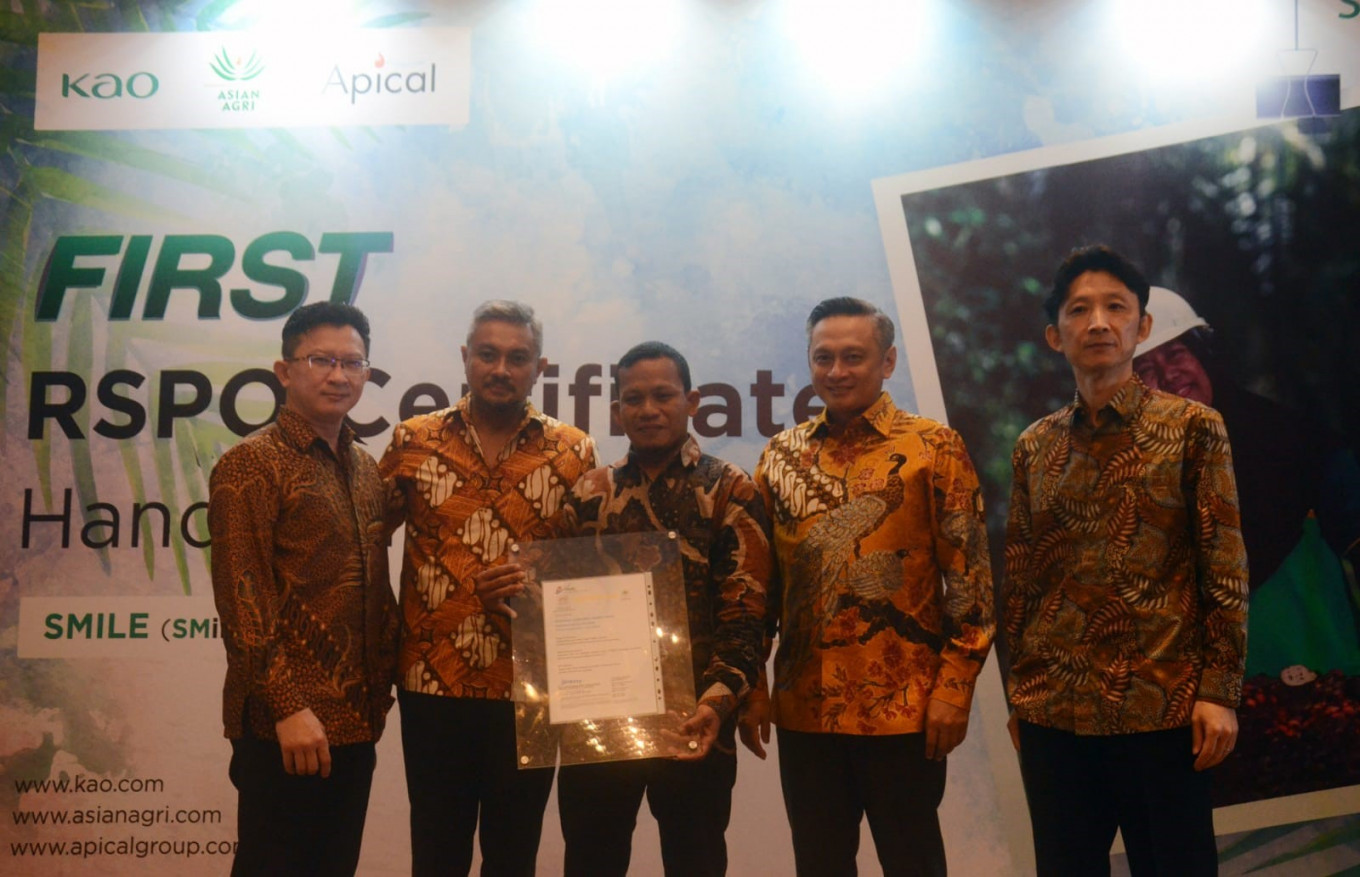Popular Reads
Top Results
Can't find what you're looking for?
View all search resultsPopular Reads
Top Results
Can't find what you're looking for?
View all search resultsA small step is a giant leap for palm oil farmers toward sustainability
SMILE is a program aimed at educating smallholders in the palm oil industry in improving their livelihoods and empowering themselves through sustainable business practices. It is a joint collaboration between Kao, Apical and Asian Agri, which was first launched in 2020.
Change text size
Gift Premium Articles
to Anyone
S
MILE is a program aimed at educating smallholders in the palm oil industry in improving their livelihoods and empowering themselves through sustainable business practices. It is a joint collaboration between Kao, Apical and Asian Agri, which was first launched in 2020. The first phase of SMILE was participated by 698 smallholders in North Sumatra, Riau and Jambi who signed a Memorandum of Understanding (MoU) with PT IntiIndosawit Subur of Asian Agri.
Today, the three companies that initiated the program announced a milestone, with 239 independent smallholders in North Sumatra having completed the first phase of their journey to sustainability. The smallholders were awarded Roundtable on Sustainable Palm Oil (RSPO) certificate based on their audits. It was celebrated with the first ever RSPO certificate handover at The Dharmawangsa Hotel in Jakarta on Thursday (14/07/2022).
“We launched SMILE to reduce the social and economic gaps that affect the livelihoods of independent smallholders by providing training and workshops to enhance smallholders’ technical knowledge, allowing them to receive RSPO certificate for the first phase of the audit through the adoption of good sustainable practices. The independent smallholders deserve commendation, and we are eager to see what the future holds for them,” said Bremen Young, sustainability director at Apical.
The audit was conducted by an internationally accredited organization, PT Mutuagung Lestari, and follows a strict verification process. It is aligned to stringent RSPO principles and criteria for sustainable palm oil production. To be able to earn the certification, a smallholder must show in an audit no deforestation, waste management and the protection of peatlands. Those that were awarded during the ceremony passed the audit from 18 to 21 April with zero negative findings.
Along with Bremen, the celebration was also attended by Bernard A Riedo, director of Sustainability and Stakeholder Relations at Asian Agri, Maeda Yasuhiko, president and CEO of Kao Corporation Indonesia, Guntur Cahyo Prabowo, acting head of Smallholders RSPO Indonesia, and Khairul Aman, head of Cooperatives at Koperasi Konsumen Tebing Tinggi Pangkatan Sejahtera (KKTTPS).
“We are honored to be part of the certification ceremony as this is another encouraging milestone for the SMILE program. With SMILE, we are able to build a sustainable supply chain by upskilling independent smallholders to adopt the best agriculture practices for better livelihoods,” said Maeda.
Indonesia is the biggest palm oil producer in the world, with Coordinating Economic Minister Airlangga Hartarto having shared that the commodity contributed 3.5 percent to the country's GDP in 2020. Bernard explained that the palm oil industry also helped create job opportunities for the 2.6 million farmers, and that 40 precent of the industry was made up of independent smallholders. While the SMILE initiative has helped many in North Sumatra, Riau and Jambi, the collaboration has set a goal of expanding into Kalimantan in the future.
“Basically, we have a target of 5,000 farmers in the three provinces where Asian Agri operates, in North Sumatra, Riau and Jambi. But on top of that, [we are looking to target] other provinces if we can engage [with them] later on. If the possibility is there, then we can look forward to that. Our target of 5,000 will be in these three provinces until 2030,” said Bernard, on setting a realistic target. He reiterated that Asian Agri was fully committed to following through.
The remaining smallholders of phase one will undergo the RSPO main audit in the third quarter of 2022, with their progress monitored continuously. Meanwhile, preparations are currently underway for the RSPO certification process for registered smallholders under phase two.
“For Asian Agri, this is the journey of smallholders for sustainability. How we started was by engaging [smallholders], understanding the challenges they face, the issues – including the formation of groups or bodies – and helping them to work together. By doing this, you can not only reduce the cost, but increase the effectiveness, and by engaging together with the company and implementing the best practices in a sustainable way, they will see the outcome,” Bernard said.
This initiative is not a first for Asian Agri, which has worked with other independent smallholders in Jambi, who are now certified but did not participate the SMILE program. While the practice of complying with the RSPO is not foreign, the company ensures that their entire supply chain is certified through the program. The conversation was concluded by Maeda, who said that were very optimistic about the future and the great potential for exponential growth as more farmers realize the benefits.










